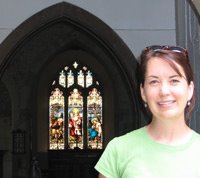3: Kinship
Austen had a wry eye, catching and making the most of other people’s foibles and her own. She was the single girl from the country, the one no one would have expected anything from, who analyzed the newly-developed literary form, the novel, diagnosed its problems (the pages of unnecessary words, the unbelievable goodness of most heroines, the predictable world-falls-apart-on-our-heroine-
yet-because-of-her-unbelievable-enduring-goodness-all-is-
miraculously-saved story arcs), and set it aright – again, in a place no one looked for it, in simple country life, with a view of every realm of society’s tendencies to the ridiculous. We recognize her characters today in our friends and family and the occasional slightly ridiculous acquaintance, and her dialog is pitch-perfect.
There are two things that puzzle biographers that have never bothered me. The first is her complex character – the good Christian girl with the biting wit, with the ability to see and desire to expose the laughable and ludicrous. Most of the things that surprise them are in her letters to her sister Cassandra, where (and perhaps the only place) she could freely say whatever she wanted.
Perhaps this doesn’t surprise me because of my own experiences entrenched in American Christianity, although our expressions of faith are far different than they were in Austen’s England. But my closest friends and I, if unquestionably faithful, are not overwhelmingly or unnaturally good – at least, not blandly so. Our everyday lives are part prayer and part perspicacity and personality, with conversations ranging from incisive devotional thoughts to disappointing prospective beau (duck farmers, bad mustaches, and arrogant missionaries among them), from solving poverty to the creepy, ass-ogling married guys buying us drinks downtown. It’s no surprise to me that Jane’s life encompassed both as well – that she had a capacity for devotion as well as an ability to wryly (if at times harshly) engage the world around her.
The other topic every Austen biographer must address is her quiet, seemingly eventless life, which is how her brother described her in his first biographical sketch and how her nephew characterized her. To her brother Henry, she was the home-bound sister, to nephew James, she was dear Aunt Jane – funny, charming, full of life, and no doubt unquestionably talented, but still – what really happened in her life? And so the biographers dig, and find love, heartbreak, family conflict, the loss of her dear childhood home, periods of great financial insecurity, dear friends and tragic deaths. “Her life was not without event,” they say.
And I think, of course. How many of our lives would people judge as entirely unremarkable – lives in which, perhaps, love fails, careers are made or broken, deep friendships and family relationships endure, tragedy is in some form or other inescapable and the future is at times murky. These are our realities, and that’s where Jane specialized – the drama of ordinary life. Not inflated beyond recognition, not with unbelievable goodness or incredible tragedy. Just mothers and fathers, sisters, friends. Pesky neighbors and rich neighbors and neighbors who like you and still want to get the better of you. At times ridiculous clergy. Good-looking, weak-charactered men, good-hearted plain men, unbelievably rich men with character faults all their own. Everyone’s foibles on display, with a bit of grace for nearly every character.
But I think perhaps the area I feel closest to Jane is in my singleness – in loving freedom and simultaneously longing for companionship. Jane wanted marriage if she could have a great marriage with real love; she was unwilling to settle for a relationship that was merely a good social move that would give her financial security. She wanted an equal, someone who would be an intellectual rival, who would respect her. At the same time she felt the disgust of the continual bearing of children forced on any woman who married, part of her hoped for the unexpectedly, unbelievably good match. Perhaps I read too much into this, but who could read her books and conclude otherwise?



1 Comments:
Did you actually attend the Jane Austen festival in Bath?
Post a Comment
<< Home